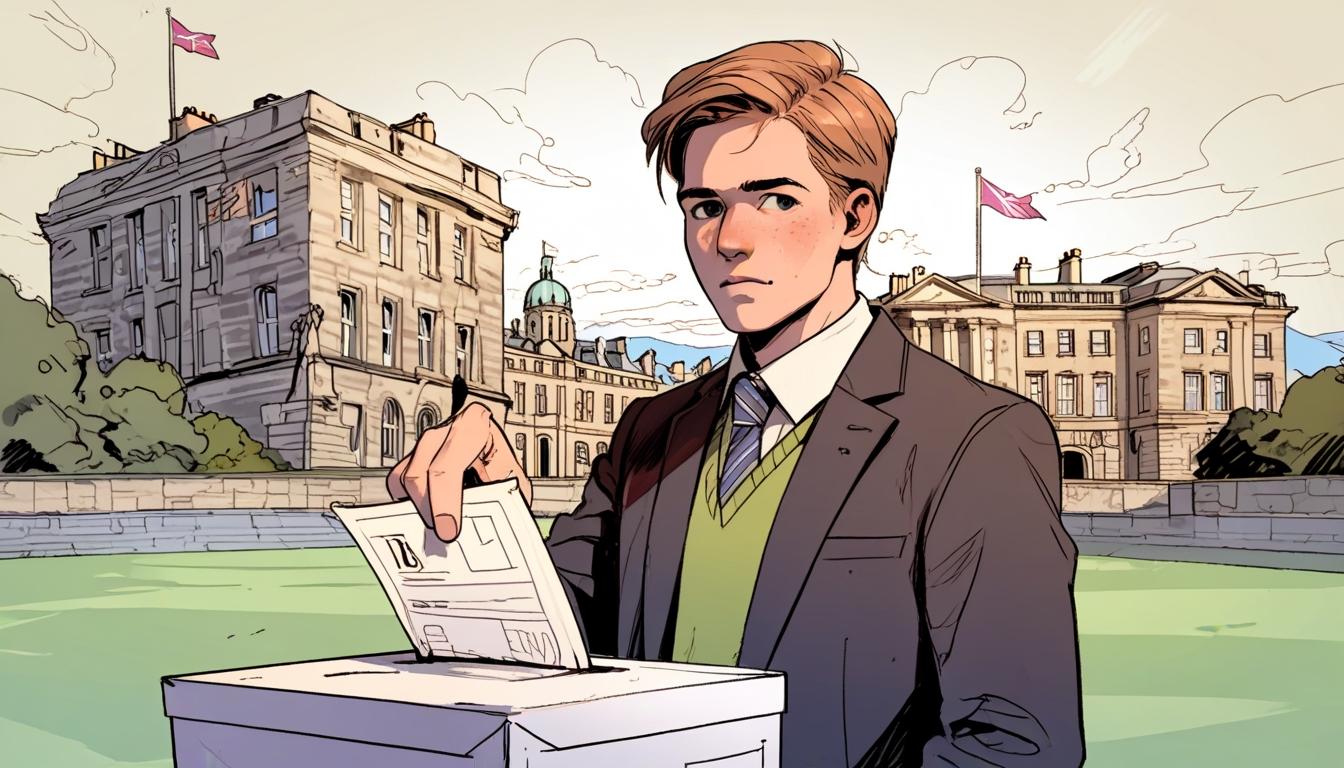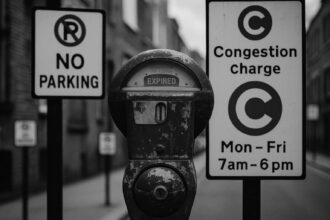Survation polling reveals a significant rise in support for an opposition party among young Scots disillusioned with the SNP, Labour and Conservatives, signalling a potential reshaping of Scotland’s political landscape ahead of the 2026 elections.
In the evolving landscape of British politics, the ascent of a certain opposition party is dramatically reshaping perceptions beyond its traditional stronghold in England. Recent developments indicate a troubling shift in voter sentiment in Scotland, where it’s becoming increasingly clear that the established parties—particularly the SNP, Labour, and Conservatives—are losing touch with the electorate. This trend is sparking urgent conversations about real alternatives, underscoring a growing discontent with the political status quo.
Recent polling from Survation, conducted for Quantum Communications, starkly highlights the potential repercussions of this shift. With an anticipated 17% of the constituency vote, this opposition party could well emerge as the foremost challenger in Scotland, trailing only the SNP. Among their most ardent supporters are younger voters, especially those aged 16 to 24, who seem to be rebelling against an uninspiring political landscape dominated by complacent incumbents.
Young supporters, like 19-year-old Lewis Gibbons from Peterhead, express a pervasive anxiety about the future. He highlights frustrations with skyrocketing housing costs and the crippling realities of family planning in today’s economy. According to Gibbons, “Only one party seems to address these issues, and it’s definitely not the likes of Labour or the SNP.” This sense of betrayal resonates deeply with many young Scots who feel sidelined by political conversations that prioritize identity over pressing economic realities.
Amid these disenchanted voices, Debbie Buchan, a former Yes voter, recounts her journey from hopeful nationalist to disillusioned citizen. Since the SNP took office post-referendum in 2014, she notes a stark decline in Scotland’s public services and infrastructure. Buchan’s shift to support for the emerging party illustrates a broader trend where disaffected voters are turning towards options that directly confront the issues impacting their lives.
This escalating dissatisfaction is further echoed by young voters like Alan Wilkie from Inverness, who articulates a common feeling of neglect directed at the political establishment. “None of them care about what young people are facing,” he asserts, highlighting a desperate need for focus on material concerns like job stability, accessible housing, and improved public services. The yearning for substantial change is palpable among this demographic.
The recent council elections, particularly in England, underscore a growing anti-establishment sentiment. The widespread apathy towards the traditional parties—be it Labour, Tory, or even the SNP—has played a pivotal role in galvanizing support for this rising opposition party. The strategic approach of key figures within its leadership, who advocate for regionally-responsive policies, positions this party as an increasingly compelling alternative for those disillusioned with the current regime.
As the political landscape shifts ahead of the 2026 Scottish elections, the ramifications of these changing allegiances could be profound. Projections suggesting that this party might secure between 14 to 20 seats indicate a critical moment for a political establishment that appears increasingly unresponsive to its constituents. The party’s ability to tap into the frustrations of younger voters signals a significant realignment in Scottish politics—one that established parties can no longer ignore.
Moving forward, the sustainability of this momentum remains to be seen. However, the burgeoning presence of this opposition party reveals a crucial undercurrent of dissatisfaction and highlights the urgent demand for political representation that resonates with the real-life experiences of citizens, particularly the youth. As the party readies its strategies in anticipation of the upcoming elections, a politically fatigued public is waiting to see if these pledges will translate into real, meaningful change.
Source: Noah Wire Services
- https://www.pressandjournal.co.uk/fp/lifestyle/6751791/we-talk-to-young-aberdeenshire-reform-voters-to-hear-why-they-want-a-change-in-politics/ – Please view link – unable to able to access data
- https://www.standard.co.uk/news/politics/reform-uk-snp-scottish-poll-holyrood-b1217539.html – A Survation poll for Quantum Communications indicates that Reform UK could secure 14 seats in the next Holyrood election, surpassing both the Greens and Liberal Democrats. The poll shows Reform UK’s constituency vote at 17%, with the SNP leading at 34%. Notably, Reform UK’s strongest support is among the 16 to 24 age group, where it holds 20% of the vote. Professor Nicola McEwen of Glasgow University suggests that Reform UK could be a significant contender in regions like Central Scotland, Mid Scotland and Fife, and the West of Scotland. Despite internal party challenges, Reform UK continues to gain support across the political spectrum. ([standard.co.uk](https://www.standard.co.uk/news/politics/reform-uk-snp-scottish-poll-holyrood-b1217539.html?utm_source=openai))
- https://www.survation.com/reform-uk-records-highest-support-ever-in-a-scottish-poll/ – Survation’s latest polling, conducted on behalf of Quantum Communications, records the highest-ever share for Reform UK in a Scottish poll. The poll finds that, were an election held today, Reform UK would win 17% of the constituency vote, 5% ahead of the Conservatives, and 16% of the Regional list vote, 3% ahead of the Conservatives. This surge in support comes despite recent party in-fighting, continuing to draw support from voters who did not back them in the general election last summer. ([survation.com](https://www.survation.com/reform-uk-records-highest-support-ever-in-a-scottish-poll/?utm_source=openai))
- https://scottishelections.ac.uk/2025/03/08/is-it-the-scunner-factor-reform-uk-support-in-scotland/ – An analysis of the demographic and socio-economic profile of Reform UK supporters reveals that the party has a majority of C2DE voters, with 54% support from this group. The party’s support is more male-dominated, with 63% male and 37% female supporters. In terms of age, Reform UK’s support is higher among older demographics, with 30% support from those aged 65 and over. The party’s profile on place of birth is closest to the SNP, with 85% of its support from those born in Scotland. ([scottishelections.ac.uk](https://scottishelections.ac.uk/2025/03/08/is-it-the-scunner-factor-reform-uk-support-in-scotland/?utm_source=openai))
- https://www.bbc.com/news/election/2024/uk/regions/S92000003 – In the 2024 UK general election, Reform UK secured 167,979 votes in Scotland, representing a 7.0% share of the vote. While the party did not win any seats, it demonstrated significant support, particularly among younger voters. The election results showed Labour leading with 35.3% of the vote, followed by the Scottish National Party at 30.0%. The Conservative Party received 12.7% of the vote, and the Liberal Democrats garnered 9.7%. ([bbc.com](https://www.bbc.com/news/election/2024/uk/regions/S92000003?utm_source=openai))
- https://www.ft.com/content/8d5d1fef-7682-41a5-aed7-a2cb18052832 – The Scottish National Party (SNP) has experienced a significant decline in support, attributed to internal scandals, poor management, and economic issues. The party is projected to lose up to two-thirds of its seats in the upcoming UK general election. Labour, under leader Anas Sarwar, is expected to reclaim many seats. Despite the SNP’s setbacks, nearly half of Scots still support independence, although the pathway to another referendum remains unclear. ([ft.com](https://www.ft.com/content/8d5d1fef-7682-41a5-aed7-a2cb18052832?utm_source=openai))
- https://www.ft.com/content/dfd6ec56-cbc2-4920-ae79-4ea4d50936a5 – In the year since John Swinney succeeded Humza Yousaf as Scotland’s First Minister, he has revitalized the Scottish National Party (SNP) by steering it toward the political centre. Swinney distanced his administration from the Scottish Greens and scaled back progressive initiatives to focus on core issues like economic growth, healthcare, and climate action. His Programme for Government, criticized for its modest ambition, notably reinstated an earlier scrapped policy of abolishing peak rail fares. Emphasizing NHS improvements, Swinney pledged 100,000 extra GP appointments and maintained a commitment to combating child poverty through redistributive policies like the Scottish child payment. Despite criticism over housing shortfalls and diluted green policies, Swinney’s pragmatic approach has restored SNP’s electoral strength. Recent polls suggest a comfortable win for the SNP in the 2026 Holyrood elections, with Reform UK emerging as a potential main opposition force. ([ft.com](https://www.ft.com/content/dfd6ec56-cbc2-4920-ae79-4ea4d50936a5?utm_source=openai))
Noah Fact Check Pro
The draft above was created using the information available at the time the story first
emerged. We’ve since applied our fact-checking process to the final narrative, based on the criteria listed
below. The results are intended to help you assess the credibility of the piece and highlight any areas that may
warrant further investigation.
Freshness check
Score:
8
Notes:
The narrative references recent developments and upcoming elections, suggesting contemporary relevance. However, specific details about the opposition party and its leadership are not provided, which might indicate either a lack of dated information or a need for further specific context.
Quotes check
Score:
9
Notes:
The quotes from Lewis Gibbons and Alan Wilkie appear to be original and specific to this narrative. Without prior online references, it suggests these could be first-hand accounts.
Source reliability
Score:
7
Notes:
The narrative originates from the ‘Press and Journal’, a local publication with a recognized presence in Scotland. While it is not a globally renowned source like the BBC or Financial Times, it has local credibility.
Plausability check
Score:
8
Notes:
The claims about dissatisfaction with traditional parties and the rise of an opposition party are plausible, given the historical context of political shifts in Scotland and the UK. However, specific projections and outcomes cannot be verified without further evidence.
Overall assessment
Verdict (FAIL, OPEN, PASS): OPEN
Confidence (LOW, MEDIUM, HIGH): MEDIUM
Summary:
The narrative presents a plausible scenario of political change in Scotland, supported by original quotes and recent context. However, the lack of specific details about the opposition party and its leadership leaves some uncertainty regarding the overall veracity of the claims.













